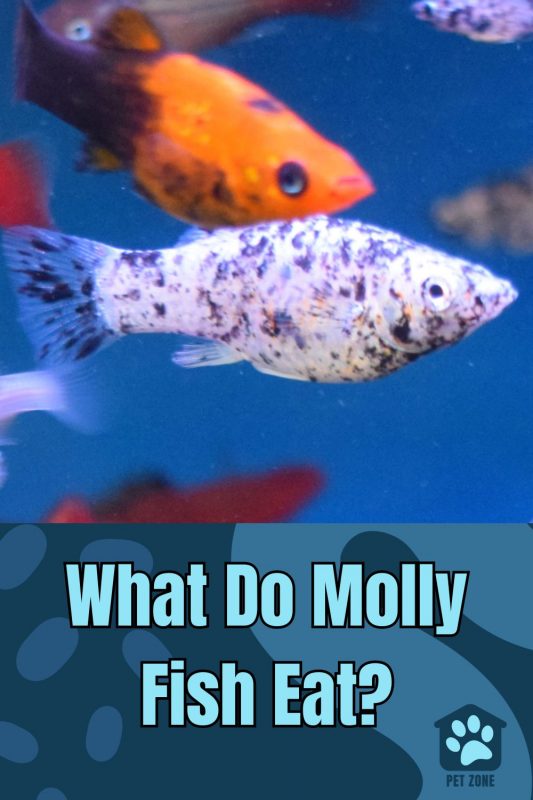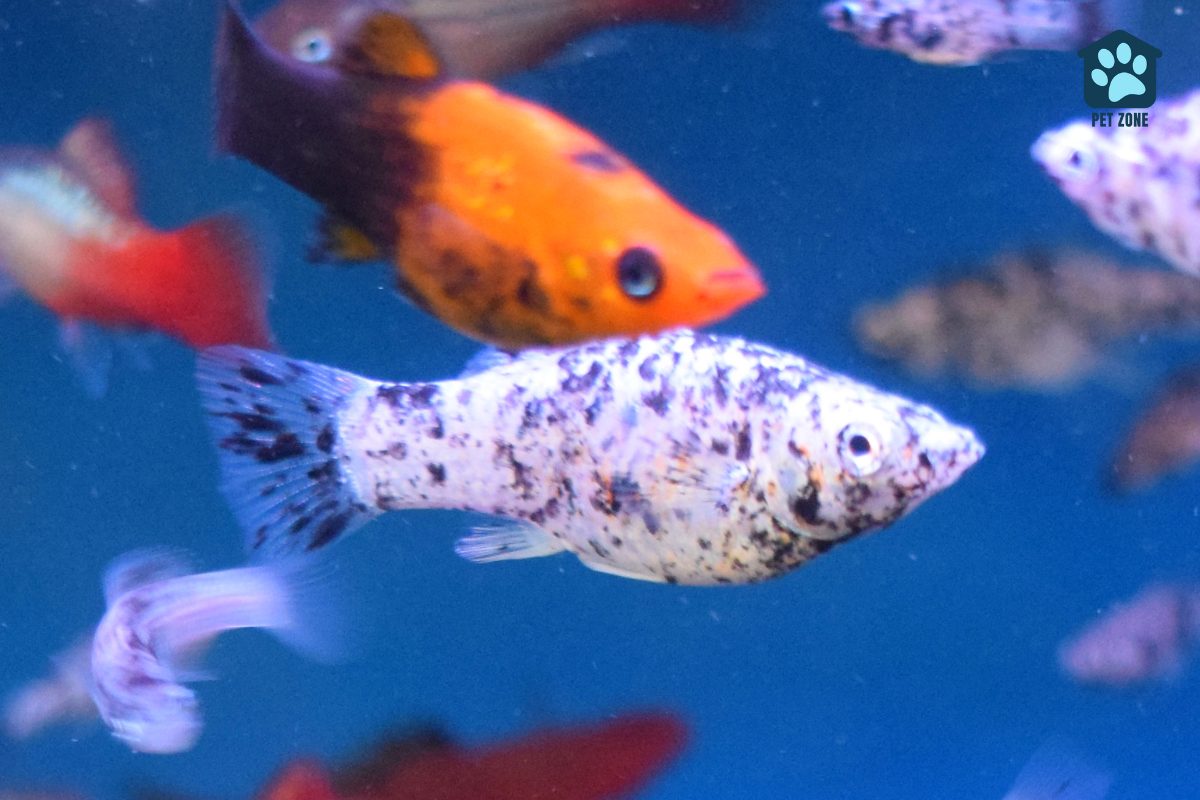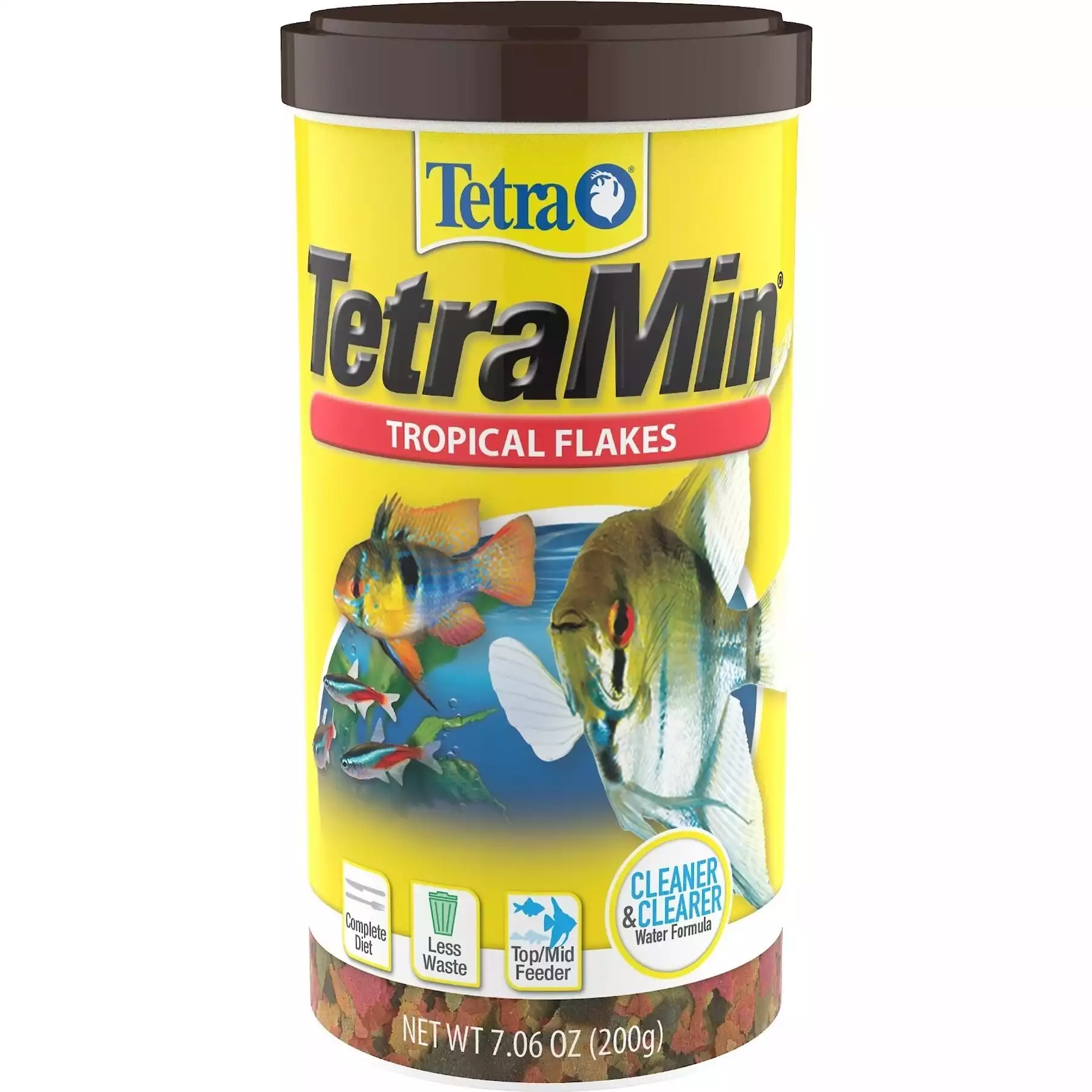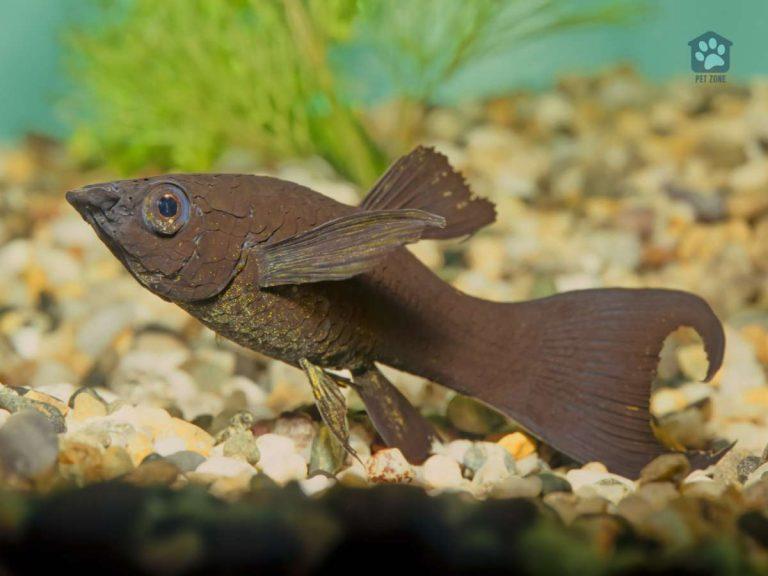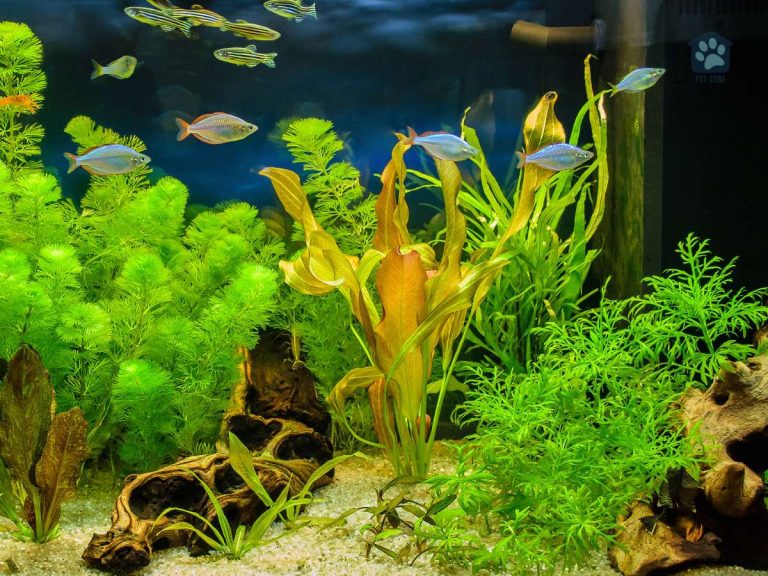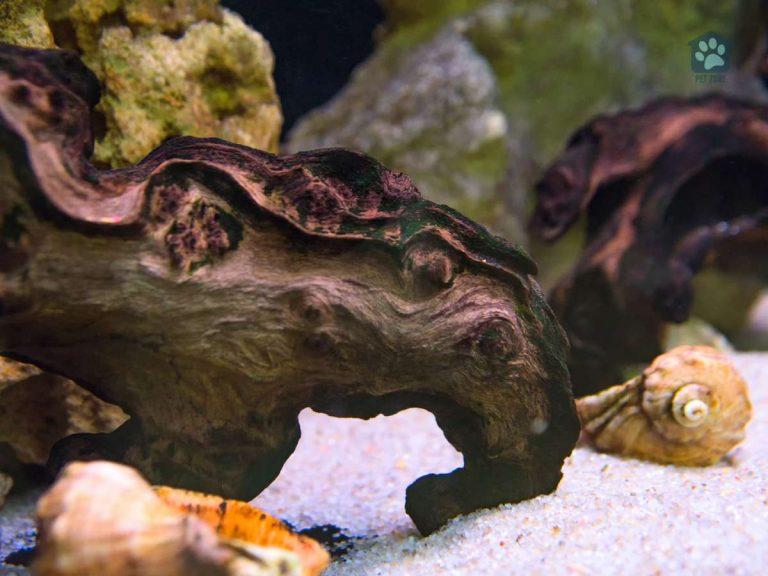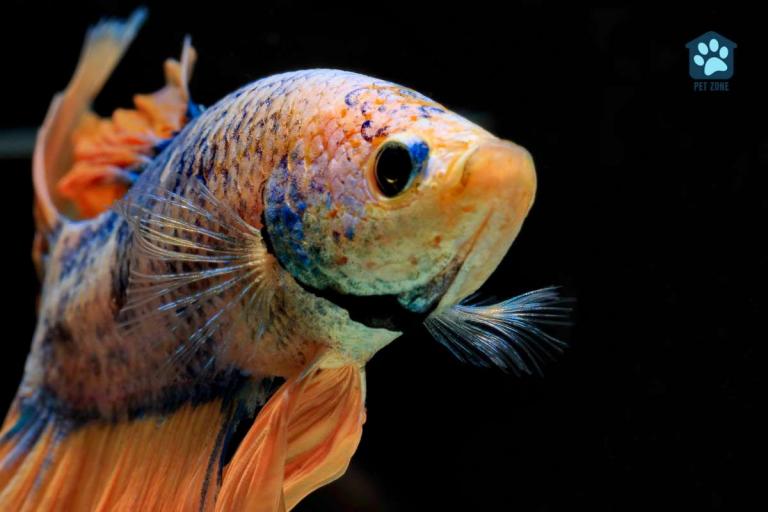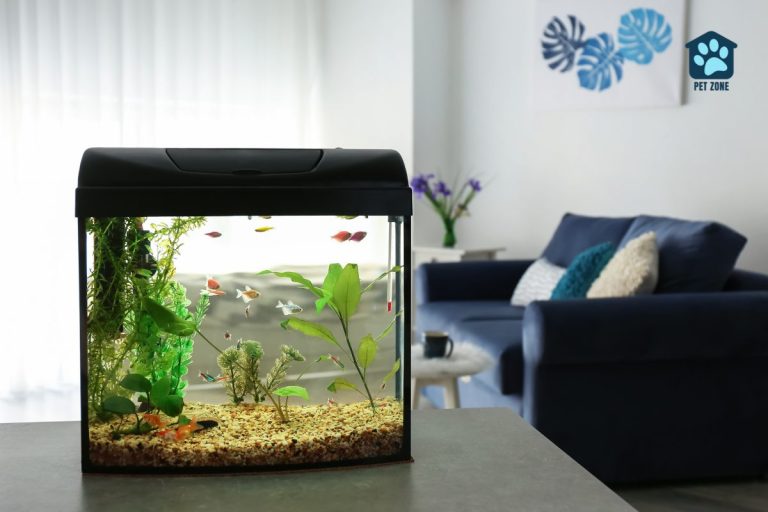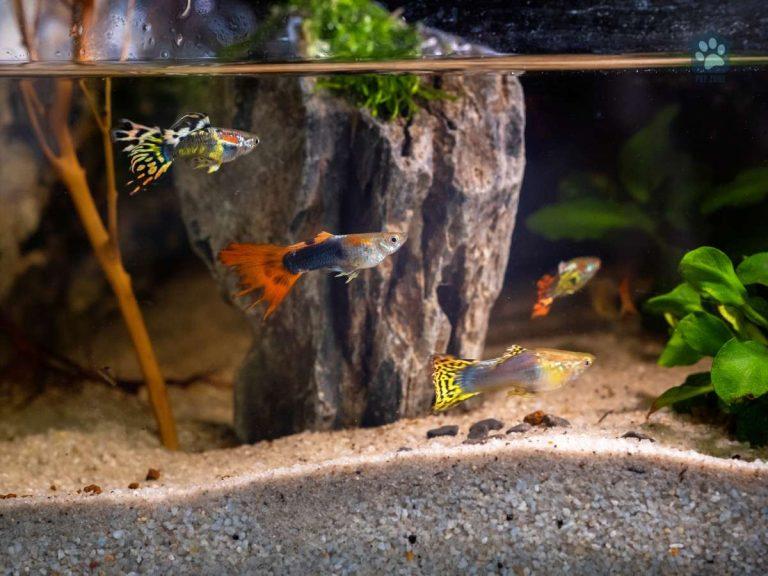Estimated reading time: 13 minutes
Have you ever gazed into your aquarium and wondered what’s on the menu for your vibrant molly fish? Whether you’re a seasoned fish keeper or new to the hobby, understanding what to feed mollies doesn’t have to be complicated.
Mollies are omnivorous creatures eagerly grazing on both plant matter and small critters in their environment. It’s crucial they munch on a diet that mimics this variety to keep them happy and healthy.
In this article, we’ll dive into the best foods to feed molly fish, from commercial flakes to garden-fresh veggies, and provide easy-to-follow advice for feeding regimes.
Key Takeaways
- Molly fish are omnivores that need a diet of both plant matter and small water creatures. They like high-quality flakes, frozen foods, vegetables, and sometimes homemade foods.
- When feeding your molly fish at home, give them small amounts of food 2 – 3 times daily to avoid overfeeding and keep the water clean.
- To help mollies stay healthy, prepare their veggies by washing and chopping them into bite – sized pieces. Sometimes blanching the veggies so they’re soft but not mushy is good too.
- If your molly fish stops eating or looks sick, check if something is wrong with the water or if they have an illness. Overfeeding can also make them unhealthy.
- Mixing up what you feed your molly fish with different store – bought and homemade foods keeps them happy. It’s like how in the wild they eat many things!
Understanding Your Molly Fish
Molly fish are interesting creatures to have in your freshwater aquarium. They come in many types, like the sailfin, dalmatian, and balloon molly. These small fish are super friendly and love swimming around with their friends.
Mollies are special because they eat both plants and tiny water animals, which makes them omnivores. In a tank at home or in a store, you need to make sure they get the right mix of foods to stay happy and healthy.
They really like munching on algae growing in their tanks too!
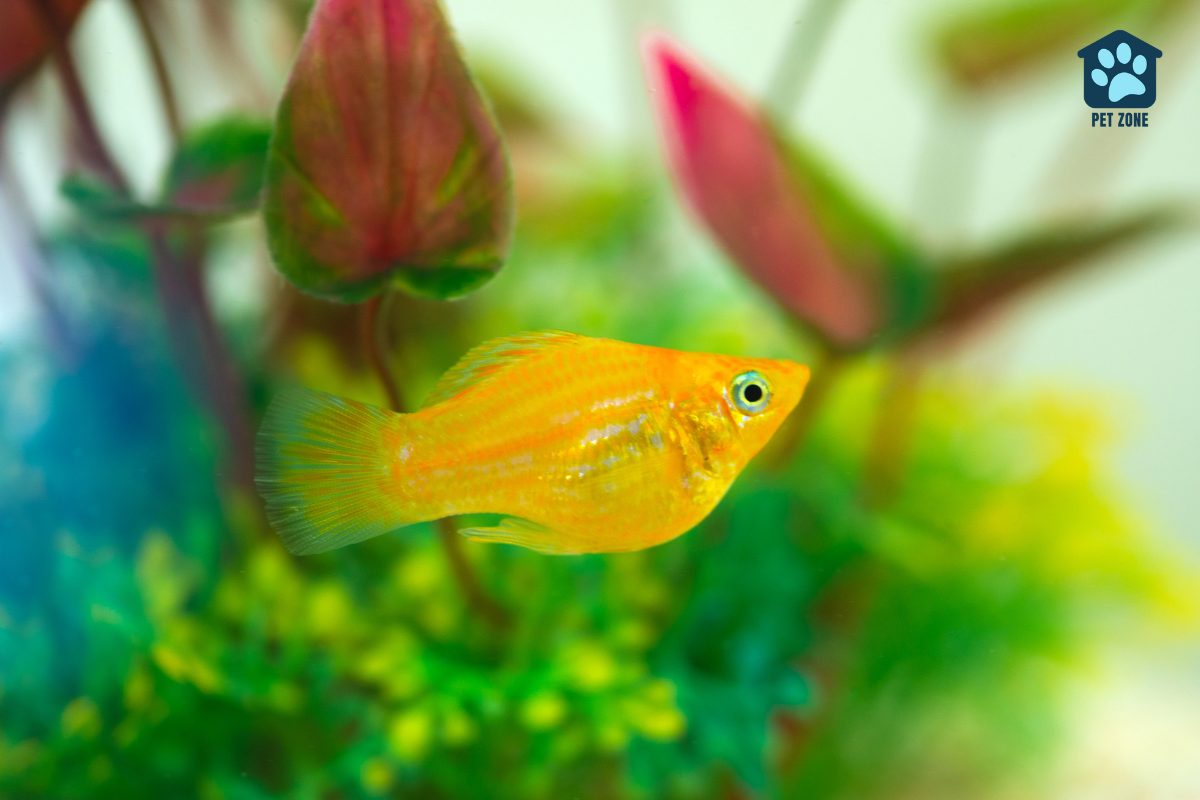
What Do Mollies Eat?
Molly fish are omnivorous and have a varied diet, including plant matter, algae, small invertebrates, and even the occasional fish fry. In captivity, their diet can consist of high-quality flakes, frozen foods, granules, veggie pallets & tablets, and homemade options like veggies and beef heart paste.
Natural Diet in the Wild
Molly fish are adventurers in eating. They munch on tiny creatures, crunchy insects, and wiggly worms. These fish love to gobble up algae and plants too. Think of them as little swimmers with a taste for salad and seafood combo meals.
In their wild homes, mollies are nearly always nibbling on plants or scouring for snacks like crustaceans. Their diverse diet helps keep them happy and healthy under the sunlit waters where they splash around.
Diet in Captivity
Moving from the rich variety of mollies’ natural diet, their menu changes a bit at home. In your aquarium, you need to give them good food that keeps them healthy and happy. High-quality flake foods are a great choice for your molly fish’s daily meals. These flakes have all the important nutrients that mollies need.
You can also add other types of food to spice up their diet. Frozen or live brine shrimp will make your fish super excited! Mollies like green stuff too, so drop in some algae wafers or let them nibble on soft veggies sometimes.
Just make sure you don’t feed them too much – bellyaches are no fun for anyone!
Recommended Commercial Foods for Molly Fish
High-quality flakes, frozen foods, granules, veggie pallets & tablets, and freeze-dried foods are all recommended commercial foods for feeding your molly fish. Each type of food offers different nutritional benefits to keep your mollies healthy and thriving.
High-Quality Flakes
Molly fish thrive on a diet of high-quality flake food, which provides essential nutrients for their well-being. These omnivorous creatures enjoy consuming small invertebrates, algae, plant matter, crustaceans, insects, and worms in the wild.
However, in a home aquarium setting, it is crucial to offer them standard tropical fish flakes to meet their nutritional needs. While mollies are not classified as exceptional algae-eaters, they do have a penchant for snacking on it regularly.
If you’re looking for five-star rated, high-quality flakes, check out our recommendation!
These flakes are suitable for most tropical freshwater tanks, including cichlids. guppies, tetras, and similar fish.
- Complete and balanced
- Contains patented ProCare vitamin blend
- Less waste for cleaner aquarium water
By incorporating high-quality flake food into their diet, pet owners can ensure that their mollies receive the necessary nutrients for optimal health and longevity.
In addition to being nearly exclusive plant and algae eaters in their natural habitat, mollies also benefit from shrimp consumption and often rip apart larger shrimp to feed on them.
Frozen Foods
When it comes to feeding your Molly fish, incorporating frozen foods can be a beneficial addition to their diet. Frozen foods such as brine shrimp and bloodworms provide essential nutrients that mimic their natural diet in the wild.
These foods are rich in protein and other valuable elements that contribute to the overall health and vitality of your Molly fish. By offering a variety of frozen options, you can ensure that your pet mollies receive a well-rounded and nutritious diet that promotes their wellbeing.
By introducing frozen foods into your molly fish’s feeding routine, you are providing them with an opportunity to experience different tastes and textures while also promoting their natural foraging behavior.
Granules
Molly fish can benefit from eating high-quality granules, which are specifically formulated to provide essential nutrients for their omnivorous diet. These granules often contain a mix of plant-based and protein-rich ingredients, catering to the varied nutritional needs of mollies.
When choosing granules for your molly fish, look for options that include algae and spirulina, as these mimic the natural diet of mollies in the wild.
Additionally, select granules that sink slowly to allow all your molly fish to have an equal chance at feeding time.
By incorporating granules into their diet alongside other recommended foods, you can ensure that your molly fish receive a well-rounded and balanced nutrition plan – vital for their overall health and vitality in your home aquarium.
Veggie Pallets & Tablets
To supplement your molly fish’s diet, consider incorporating veggie pallets and tablets. These specially formulated foods contain essential nutrients and fiber to support your molly’s health.
They are designed to mimic the plant-based diet that mollies typically consume in their natural habitat, ensuring they receive a balanced and wholesome diet in captivity. Veggie pallets and tablets also help in controlling mollies’ digestive systems and contribute to maintaining optimal health through nutrient-rich ingredients such as spirulina, zucchini, spinach, and other vegetables.
These foods provide a convenient way to augment your molly fish’s nutritional intake while supporting their herbivorous tendencies.
Freeze-dried Foods
When it comes to feeding your Molly fish, freeze-dried foods can be a convenient and nutritious option. Freeze-dried foods retain most of their nutritional value and are easy to store.
They come in a variety of options including bloodworms, brine shrimp, and tubifex worms which provide essential protein for your mollies. These foods can be an excellent supplement to their diet, offering a diverse range of nutrients that mimic their natural diet in the wild.
However, it’s important not to overfeed these as they can expand once consumed.
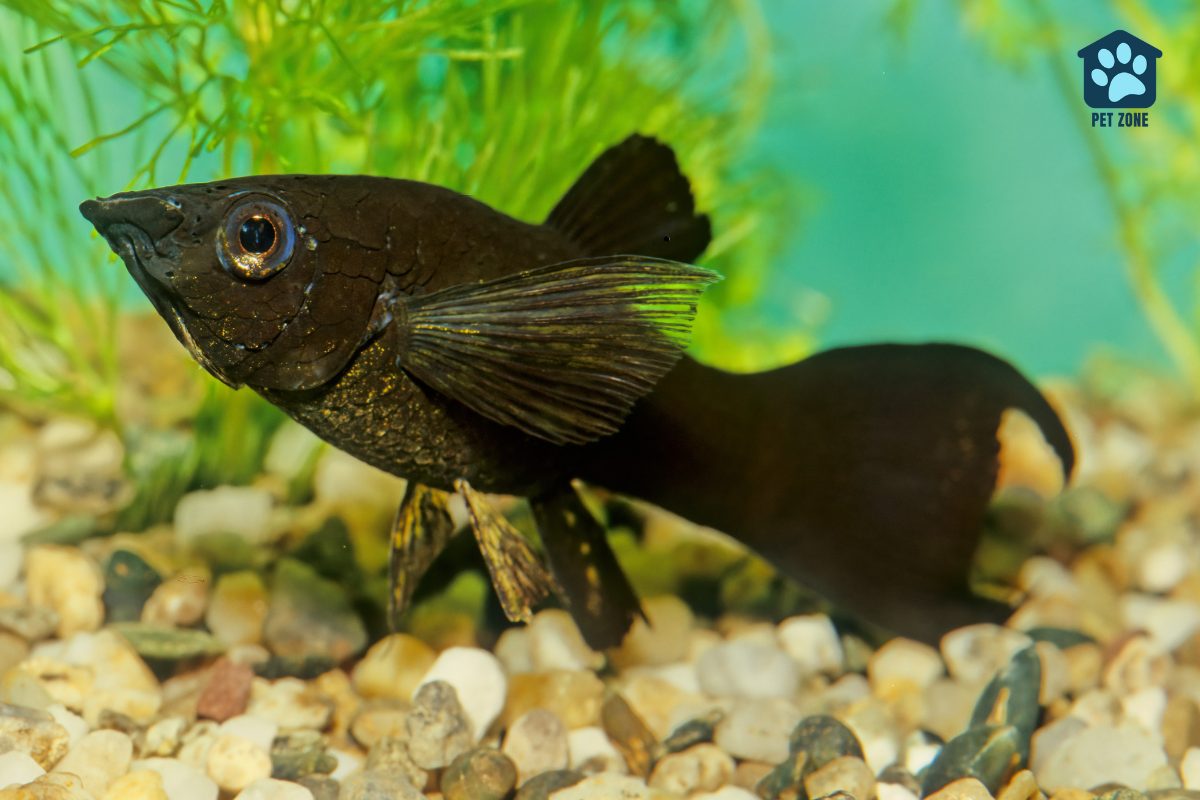
Homemade Foods for Molly Fish
Molly fish can also benefit from homemade foods, such as veggies, cultured foods, beef heart paste, and egg yolk. Providing a variety of homemade options can help ensure your molly fish receive a well-rounded diet.
Veggies
Molly fish can benefit from a variety of veggies in their diet. These omnivorous fish enjoy munching on blanched vegetables like zucchini, spinach, and cucumber. These options provide essential nutrients and fiber that contribute to a well-rounded diet for your mollies.
Providing a balanced mix of commercial foods along with occasional veggie treats ensures that your molly fish receive the necessary nutrients for their overall health and vitality, promoting optimal growth and enhancing their vibrant colors.
Offer a variety of veggies such as zucchinis, cucumbers, spinach, and peas in moderation to provide essential nutrients and fiber for your molly fish’s health. You can also offer them small pieces of peas without the outer skin, making sure they are cooked or softened for easy consumption by your aquatic pets.
Remember that mollies primarily consume plant-based foods in their natural habitat; hence, providing vegetables plays an important role in meeting their dietary requirements. Including a mix of different vegetables will offer variation and ensure that your molly fish are obtaining all the necessary nutrients required for their well-being.
Cultured Foods
To ensure a balanced diet for your Molly fish, consider including cultured foods in their feeding routine. Cultured foods can provide essential nutrients and supplement their natural and commercial diets.
One option is infusoria, a mix of microorganisms like Paramecium, which are suitable for fry due to their size and nutritional value.
Vinegar eels and microworms are also excellent choices as they can be easily cultured at home, providing a live food source that mimics the small organisms found in the wild – an important addition to your Molly’s diet.
These options not only enhance their nutrient intake but also stimulate natural feeding behaviors.
Beef Heart Paste
Moving from the option of cultured foods for your Molly fish, another nutritious choice is beef heart paste. This homemade food can provide essential protein and nutrients to support the health and vitality of your mollies.
Beef heart paste offers a rich source of proteins and amino acids that are beneficial for the growth and development of molly fish, helping them thrive in their aquarium environment.
The inclusion of beef heart paste in their diet ensures a balanced intake of nutrients that contributes to their overall wellbeing.
Considered as a significant supplement for mollies, beef heart paste aligns with their omnivorous nature, providing them with necessary protein requirements essential for their optimal growth and health.
Including this nutrient-dense food in their feeding routine alongside other recommended options can contribute to ensuring a well-rounded diet that supports the specific dietary needs of Molly fish.
Egg Yolk
Molly fish can benefit from egg yolk as a homemade food. Egg yolks are rich in nutrients like protein, vitamins, and minerals – essential for molly fish’s health.
To prepare this food for your mollies, you can mix the egg yolk with water until it forms a liquid. Then, pour a small amount into the aquarium to ensure that all mollies get some of it as overfeeding might cause water quality issues.
This homemade option can provide vital nutrition to support the overall well-being of your molly fish. However, it’s crucial to balance this with other foods to offer a varied diet essential for their optimal growth and development.
How to Prepare Veggies for Your Molly Fish
Providing a variety of fresh veggies will ensure that your molly fish receive a well-rounded diet and all the necessary nutrients they need.
To prepare veggies for your Molly fish:
- Wash the vegetables thoroughly to remove any pesticides or dirt that could harm your fish.
- Chop the vegetables into small, bite – sized pieces to make them easier for your Molly fish to consume.
- Blanch the vegetables by briefly placing them in boiling water and then transferring them to ice – cold water. This helps soften the vegetables and makes them more digestible for your fish.
- Consider feeding a variety of vegetables such as zucchinis, cucumbers, and peas to ensure a balanced diet for your Molly fish.
- Alternate between different types of vegetables to provide nutritional variety and prevent dietary boredom for your fish.
- Offer small quantities of veggies at a time, ensuring that they are consumed within a few minutes to prevent food from decaying in the tank.
- Remove any uneaten portions of vegetables after feeding to maintain water quality in the aquarium without causing pollution.
Feeding Frequency and Quantity for Molly Fish
Feed your molly fish small amounts of food 2-3 times a day. This helps prevent overfeeding and keeps the water quality in check.
- Offer an amount of food that your molly fish can consume within 2-3 minutes.
- Adjust the quantity based on their eating habits; if there’s uneaten food after 5 minutes, reduce the portion next time.
- Consider fasting them for one day a week to mimic their natural feeding patterns and aid digestion.
Troubleshooting Feeding Issues
If your molly fish are not eating, it could be due to stress, illness, or poor water conditions. Overfeeding can also lead to health issues for your mollies. To address these problems, it’s important to monitor water quality, reduce stress factors in the tank, and adjust feeding habits as needed.
Molly Fish Not Eating
If your Molly fish are not eating, it could be a sign of stress, illness, or unsuitable tank conditions.
Poor water quality can cause stress and affect their appetite. Check the water parameters for ammonia, nitrite, and nitrate levels to ensure they are within the acceptable range for mollies.
Additionally, observe their behavior for signs of illness such as lethargy or abnormal swimming patterns. Try offering different types of food to see if there’s a preference change.
Overfeeding Molly Fish
If your Molly fish are not eating, it might be tempting to overcompensate by increasing the frequency or amount of their feedings. However, overfeeding can lead to various health issues for your mollies, such as obesity and digestive problems.
Mollies have a tendency to eat whatever is available, so controlling their food intake is crucial in keeping them healthy. Overfeeding can also result in deteriorating water quality due to uneaten food breaking down and raising ammonia levels in the aquarium, which can harm your molly fish and other tank inhabitants.
Molly fish benefit from a balanced diet but giving them too much food at once or feeding them excessively can disturb this balance. It’s essential to monitor their feeding habits closely and provide appropriate portions according to what they consume within a few minutes.
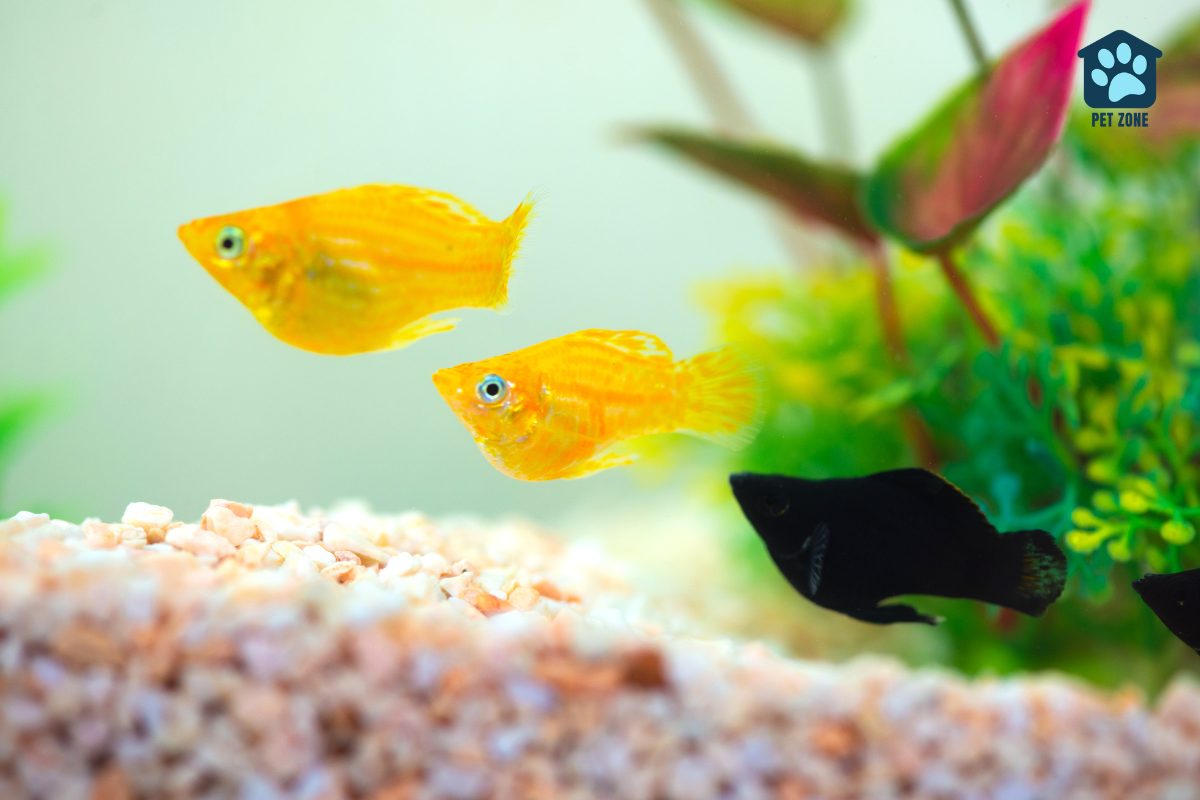
Conclusion
In conclusion, understanding what Molly fish eat is crucial for their well-being. By offering a balanced diet of high-quality flakes, frozen foods, and veggies, you can ensure the health and longevity of your pet.
Have you considered preparing homemade foods like veggies or beef heart paste for your Molly fish? Take steps to feed them right and troubleshoot any feeding issues promptly. Remember, a well-fed Molly fish is likely to be healthier and live longer in your aquarium community.
Frequently Asked Questions
Molly fish are omnivores that enjoy a mix of algae, plant matter, and commercial fish food. They like eating both greens and small creatures.
Your local pet store has great food for mollies, including flakes and pellets made just for them. Sometimes they have special treats too!
While mollies can munch on foods for other freshwater fish, it’s important they get the right nutrition designed especially for their species.
Feed your adult molly twice a day with only as much food as they can eat in one go to keep them happy and healthy.
Yes! Baby mollies or ‘molly fry’ should be given smaller bites like finely crushed flakes or specialty fry foods that are easier to nibble on.
Absolutely—these types of mollies will happily chow down on similar diets suited for most common aquarium mollies.
As an Amazon Associate I earn from qualifying purchases.
